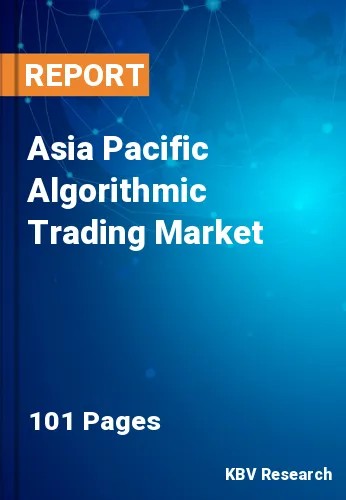Chapter 1. Market Scope & Methodology
1.1 Market Definition
1.2 Objectives
1.3 Market Scope
1.4 Segmentation
1.4.1 Asia Pacific Algorithmic Trading Market, by Component
1.4.2 Asia Pacific Algorithmic Trading Market, by Traders Type
1.4.3 Asia Pacific Algorithmic Trading Market, by Deployment Type
1.4.4 Asia Pacific Algorithmic Trading Market, by Type
1.4.5 Asia Pacific Algorithmic Trading Market, by Country
1.5 Methodology for the research
Chapter 2. Market Overview
2.1 Introduction
2.1.1 Overview
2.1.2 Market Composition and Scenario
2.2 Key Factors Impacting the Market
2.2.1 Market Drivers
2.2.2 Market Restraints
Chapter 3. Competition Analysis - Global
3.1 KBV Cardinal Matrix
3.2 Recent Industry Wide Strategic Developments
3.2.1 Partnerships, Collaborations and Agreements
3.2.2 Product Launches and Product Expansions
3.2.3 Acquisition and Mergers
3.3 Top Winning Strategies
3.3.1 Key Leading Strategies: Percentage Distribution (2017-2021)
Chapter 4. Asia Pacific Algorithmic Trading Market by Component
4.1 Asia Pacific Algorithmic Trading Solution Market by Country
4.2 Asia Pacific Algorithmic Trading Services Market by Country
Chapter 5. Asia Pacific Algorithmic Trading Market by Traders Type
5.1 Asia Pacific Algorithmic Trading Institutional Investors Market by Country
5.2 Asia Pacific Algorithmic Trading Long-Term Traders Market by Country
5.3 Asia Pacific Algorithmic Trading Short-Term Traders Market by Country
5.4 Asia Pacific Other Traders Type Algorithmic Trading Market by Country
Chapter 6. Asia Pacific Algorithmic Trading Market by Deployment Type
6.1 Asia Pacific Cloud Algorithmic Trading Market by Country
6.2 Asia Pacific On-premise Algorithmic Trading Market by Country
Chapter 7. Asia Pacific Algorithmic Trading Market by Type
7.1 Asia Pacific Stock Markets Algorithmic Trading Market by Country
7.2 Asia Pacific FOREX Algorithmic Trading Market by Country
7.3 Asia Pacific ETF Algorithmic Trading Market by Country
7.4 Asia Pacific Bonds Algorithmic Trading Market by Country
7.5 Asia Pacific Cryptocurrencies Algorithmic Trading Market by Country
7.6 Asia Pacific Others Algorithmic Trading Market by Country
Chapter 8. Asia Pacific Algorithmic Trading Market by Country
8.1 China Algorithmic Trading Market
8.1.1 China Algorithmic Trading Market by Component
8.1.2 China Algorithmic Trading Market by Traders Type
8.1.3 China Algorithmic Trading Market by Deployment Type
8.1.4 China Algorithmic Trading Market by Type
8.2 Japan Algorithmic Trading Market
8.2.1 Japan Algorithmic Trading Market by Component
8.2.2 Japan Algorithmic Trading Market by Traders Type
8.2.3 Japan Algorithmic Trading Market by Deployment Type
8.2.4 Japan Algorithmic Trading Market by Type
8.3 India Algorithmic Trading Market
8.3.1 India Algorithmic Trading Market by Component
8.3.2 India Algorithmic Trading Market by Traders Type
8.3.3 India Algorithmic Trading Market by Deployment Type
8.3.4 India Algorithmic Trading Market by Type
8.4 South Korea Algorithmic Trading Market
8.4.1 South Korea Algorithmic Trading Market by Component
8.4.2 South Korea Algorithmic Trading Market by Traders Type
8.4.3 South Korea Algorithmic Trading Market by Deployment Type
8.4.4 South Korea Algorithmic Trading Market by Type
8.5 Singapore Algorithmic Trading Market
8.5.1 Singapore Algorithmic Trading Market by Component
8.5.2 Singapore Algorithmic Trading Market by Traders Type
8.5.3 Singapore Algorithmic Trading Market by Deployment Type
8.5.4 Singapore Algorithmic Trading Market by Type
8.6 Malaysia Algorithmic Trading Market
8.6.1 Malaysia Algorithmic Trading Market by Component
8.6.2 Malaysia Algorithmic Trading Market by Traders Type
8.6.3 Malaysia Algorithmic Trading Market by Deployment Type
8.6.4 Malaysia Algorithmic Trading Market by Type
8.7 Rest of Asia Pacific Algorithmic Trading Market
8.7.1 Rest of Asia Pacific Algorithmic Trading Market by Component
8.7.2 Rest of Asia Pacific Algorithmic Trading Market by Traders Type
8.7.3 Rest of Asia Pacific Algorithmic Trading Market by Deployment Type
8.7.4 Rest of Asia Pacific Algorithmic Trading Market by Type
Chapter 9. Company Profiles
9.1 Software AG
9.1.1 Company Overview
9.1.2 Financial Analysis
9.1.3 Segmental and Regional Analysis
9.1.4 Research & Development Expense
9.2 Tata Consultancy Services Ltd.
9.2.1 Company Overview
9.2.2 Financial Analysis
9.2.3 Segmental and Regional Analysis
9.2.4 Recent strategies and developments:
9.2.4.1 Product Launches and Product Expansions:
9.2.5 SWOT Analysis
9.3 Thomson Reuters Corporation (The Woodbridge Company)
9.3.1 Company Overview
9.3.2 Financial Analysis
9.3.3 Segmental and Regional Analysis
9.3.4 Recent strategies and developments:
9.3.4.1 Product Launches and Product Expansions:
9.4 Argo SE, Inc.
9.4.1 Company Overview
9.5 MetaQuotes Ltd.
9.5.1 Company Overview
9.5.2 Recent strategies and developments:
9.5.2.1 Product Launches and Product Expansions:
9.5.2.2 Partnerships, Collaborations, and Agreements:
9.6 Symphony Fintech Solutions Private Limited
9.6.1 Company Overview
9.6.2 Recent strategies and developments:
9.6.2.1 Partnerships, Collaborations, and Agreements:
9.7 Kuberre Systems, Inc.
9.7.1 Company Overview
9.8 Trading Technologies International, Inc.
9.8.1 Company Overview
9.8.2 Recent strategies and developments:
9.8.2.1 Partnerships, Collaborations, and Agreements:
9.8.2.2 Acquisition and Mergers:
9.9 Vela Trading Systems LLC
9.9.1 Company Overview
9.9.2 Recent strategies and developments:
9.9.2.1 Product Launches and Product Expansions:
9.9.2.2 Partnerships, Collaborations, and Agreements:
9.9.2.3 Acquisition and Mergers:
9.10. Tethys Technology, Inc.
9.10.1 Company Overview

